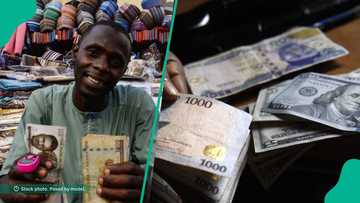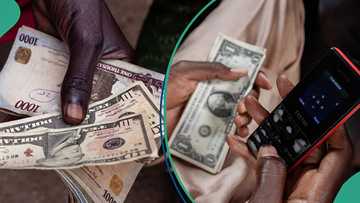Speculators Cash Out as Dollar Soars Amid Naira Crash in FX Market
- The naira has depreciated for the second day to its lowest in May as new demands flood the FX markets
- At the end of trading on Tuesday, May 6, 2025, the naira depreciated, trading at N1,609 to the dollar from N1,605 the previous day
- The naira’s fall has been blamed on several factors, including a drop in oil prices and external reserves depreciation
Legit.ng’s Pascal Oparada has reported on tech, energy, stocks, investment and the economy for over a decade.
The Nigerian currency has crashed against the US dollar for the second day this week, amid renewed volatility in the FX markets.
Experts have speculated further crash of the local currency amid global trends such as falling oil prices and dwindling national FX reserves.

Source: Getty Images
Naira’s crash is blamed on low oil prices
The naira’s continued collapse has also been blamed on the sweeping trade tariffs imposed by the US President, Donald Trump.

Read also
Traders quote new exchange rates as naira falls against US dollar, pound, euro at black market
Meanwhile, at the close of trading on Tuesday, May 6, 2025, the naira crashed to N1,609 to the dollar, from N1,605 the previous day.
The crash is the lowest in May following the various interventions by the Central Bank of Nigeria (CBN).
Currency dealers quote the dollar at a high of N1,609.50 and a low of N1,603 per dollar, leaving an N6.50 margin.
Naira remains steady in the black market
However, the naira has remained relatively steady in the parallel market, trading at N1,610 per dollar since Friday, May 2, 2025.
Black market traders disclosed that demand for the US greenback has moderated but is expected to rise amid the summer holidays.
“We are going into a high-demand season due to the coming summer holidays. For now, demands are not so high,” Abbas Yishau, a black market operator, told Legit.ng.
CBN records a loss trying to defend the naira
The naira crash came as CBN recorded a N13.9 trillion loss, about $9 billion, as it tried to settle overdue contracts, prune FX liabilities on its balance sheet and save the naira in 2024.
The loss more than doubled from N6.3 trillion in 2023 as the apex bank redeemed legacy transactions to reduce outstanding forex liabilities, lowering FX exposure and boosting reserves.
In 2023, the bank published its finances to boost investor confidence and enhance transparency in its affairs and foreign exchange management.
According to reports, the development came as the bank aimed to remove capital controls, enable the naira to trade freely and lure inflows to end dollar scarcity.
The bank’s financial reports reportedly raised concerns about the actual size of Nigeria’s external reserves and the apex bank’s capacity to support the naira, as it disclosed large deals with JP Morgan and Goldman Sachs involving foreign currency contracts for cash to support the government’s revenue.
CBN settles debts to foreign banks
Bloomberg reported that the CBN said in April that it had settled deals, including swaps and forward contracts, to bring Nigeria’s net foreign currency to $23 billion as of December last year.
As of April 30, 2025, Nigeria’s gross external reserves increased to $37.9 billion, the highest in three weeks.
The Nigerian currency, the naira, has lost about 71% of its value against the dollar since Bola Tinubu became president and embarked on foreign currency reforms.

Source: Getty Images
Reports say liquidity management costs from the sale of high-yielding short-tenured fixed income securities meant to mop up excess naira, control inflation, and the exchange rate, increased to N4.5 trillion in 2024 from N1.5 trillion in 2023.
CBN said it is committed to external sector stability to ensure Nigeria is better positioned to meet its international obligations, stabilise the naira, and boost macroeconomic confidence.
CBN adjusts Customs exchange rates
Legit.ng earlier reported that CBN has adjusted the Customs exchange rate for cargo clearance at Nigeria’s ports following the naira’s depreciation against the dollar.
The apex bank is responsible for fixing the exchange rates at which importers clear goods from Nigeria’s air and seaports.
The Central Bank of Nigeria (CBN) has adjusted the Customs exchange rate for cargo clearance at Nigeria’s ports following the naira’s depreciation against the dollar. The apex bank is responsible for fixing the exchange rates at which importers clear goods from Nigeria’s air and seaports.
Proofreading by Nkem Ikeke, copy editor at Legit.ng.
Source: Legit.ng



